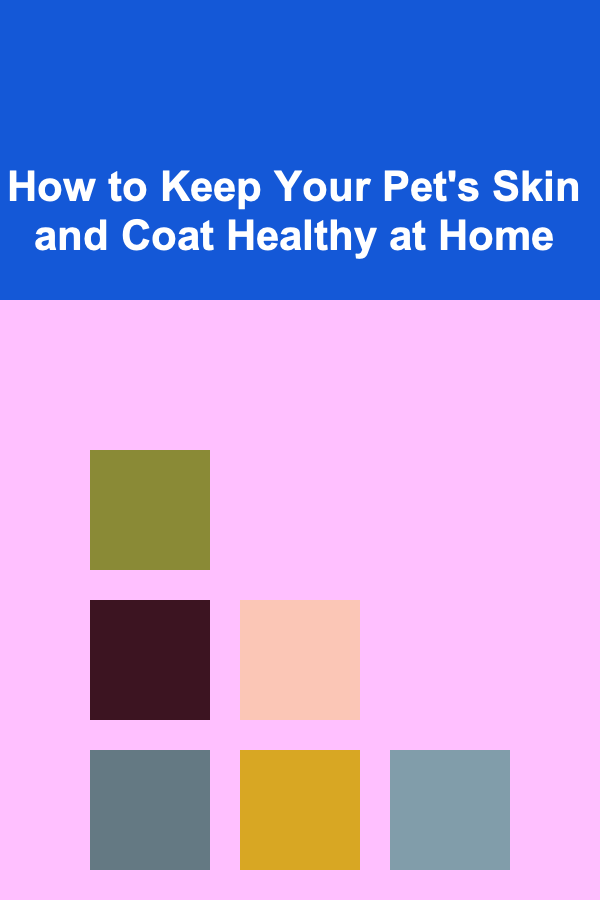
How to Keep Your Pet's Skin and Coat Healthy at Home
ebook include PDF & Audio bundle (Micro Guide)
$12.99$9.99
Limited Time Offer! Order within the next:

As pet owners, one of our main concerns is ensuring the well-being of our furry companions, and a significant part of that is maintaining the health of their skin and coat. A shiny, soft, and healthy coat is often a reflection of a pet's overall health. It plays a crucial role in protecting them from environmental stressors, and good skin health can prevent many common conditions such as dry skin, irritation, or infections. Keeping your pet's skin and coat healthy at home involves a combination of proper grooming, nutrition, regular vet visits, and creating a suitable environment.
In this article, we'll explore how to keep your pet's skin and coat in optimal condition. From regular grooming routines to understanding the role of nutrition and avoiding common skin problems, this guide will help you ensure that your pet's skin and fur remain healthy and vibrant.
The Importance of a Healthy Coat and Skin
A healthy coat and skin serve several essential functions for your pet:
- Protection: The skin acts as the primary barrier against external threats like bacteria, fungi, allergens, and UV radiation.
- Temperature Regulation: A healthy coat helps regulate body temperature, keeping pets warm in cold weather and cool in hot weather.
- Sensory Function: Pets rely on the sensory receptors in their skin to detect changes in the environment, such as movement or temperature changes.
- Appearance: A shiny, healthy coat is a visual sign of your pet's overall health, and it enhances their comfort and appearance.
Regular Grooming
Regular grooming is vital for keeping your pet's skin and coat healthy. It not only helps remove dirt, debris, and loose fur but also promotes blood circulation, which encourages hair growth and helps in the detection of any skin issues.
Brushing
Brushing your pet's coat is one of the simplest yet most effective ways to maintain skin health. The frequency and type of brush you use will depend on your pet's coat type.
- Short-haired pets: They generally need less frequent brushing, but once a week is sufficient to remove dead skin cells and promote circulation.
- Long-haired pets: Long-haired breeds need more frequent brushing, at least two to three times a week, to prevent tangling and matting. If the coat is left unbrushed, it can lead to skin irritation and infections caused by the hair pulling on the skin.
- Curly-haired pets: Breeds like Poodles or Bichon Frises require regular brushing to avoid matting and tangling. Regular brushing helps prevent painful mats from forming against the skin.
Bathing
Bathing your pet is another essential aspect of grooming. However, it's important not to overdo it, as frequent bathing can strip the skin of its natural oils, leading to dryness and irritation. Bathing frequency varies depending on the breed, lifestyle, and whether your pet has any skin conditions.
- General Rule: For most pets, bathing every 4 to 6 weeks is sufficient. However, some pets with oily or smelly coats may require more frequent baths.
- Skin Conditions: If your pet has a skin condition such as seborrhea or allergies, your vet may recommend medicated shampoos or more frequent bathing to treat the problem.
- Right Shampoo: Always use pet-specific shampoos. Human shampoos can be too harsh and cause irritation. There are shampoos designed for different coat types, such as moisturizing shampoos for dry skin or anti-itch formulas for pets with allergies.
Nail Care
Keeping your pet's nails trimmed is another essential part of grooming. Long nails can cause your pet to walk improperly, leading to posture problems or even skin issues. Regular nail trimming can also prevent nails from becoming ingrown, which can cause pain and potential infections.
- Frequency: Most pets need their nails trimmed every 2 to 4 weeks. Some pets may wear down their nails naturally by walking on hard surfaces, but it's important to check regularly.
Proper Nutrition for Healthy Skin and Coat
Good nutrition plays a significant role in maintaining the health of your pet's skin and coat. What your pet eats directly impacts the condition of their skin and fur. A balanced, high-quality diet ensures that your pet gets the nutrients they need to stay healthy inside and out.
Omega-3 and Omega-6 Fatty Acids
Essential fatty acids, particularly omega-3 and omega-6, are crucial for maintaining a healthy coat. These healthy fats are found in fish oils, flaxseed, and other sources and help keep the skin hydrated, reduce inflammation, and promote healthy hair growth.
- Omega-3 fatty acids: These are known for their anti-inflammatory properties and are essential in preventing dry, flaky skin. Omega-3s are found in fish oils, such as salmon or mackerel, and in plant-based sources like flaxseed and chia seeds.
- Omega-6 fatty acids: These help improve the skin's barrier function and promote healthy hair. They are commonly found in sunflower oil, safflower oil, and evening primrose oil.
Many premium pet foods are formulated with omega-3 and omega-6 fatty acids, but if your pet's diet doesn't include enough of these, you can consider adding supplements after consulting with your veterinarian.
Proteins
Protein is essential for the maintenance of your pet's skin and coat. Hair is primarily composed of keratin, a protein, and a lack of protein in the diet can result in hair loss or poor coat quality. Meat such as chicken, beef, or lamb provides high-quality protein that supports healthy fur.
- Amino Acids: The building blocks of protein, amino acids, are essential for the formation of hair follicles and skin cells. A deficiency in certain amino acids, such as lysine or methionine, can lead to coat problems.
Vitamins and Minerals
Vitamins and minerals are important for maintaining skin health and preventing issues such as flaky skin, hair loss, and irritation. Some key vitamins to look out for include:
- Vitamin A: Essential for the maintenance and repair of skin cells. It helps prevent dry skin and dandruff.
- Vitamin E: Acts as an antioxidant and helps protect the skin from oxidative stress, which can damage skin cells and promote aging.
- Zinc: Important for wound healing and maintaining healthy skin. A deficiency in zinc can lead to hair loss and dermatitis.
Including a variety of fruits, vegetables, and meats in your pet's diet can ensure that they are getting the proper vitamins and minerals for healthy skin and coat.
Hydration
Adequate hydration is often overlooked when discussing skin and coat health. Just like humans, pets require enough water for optimal bodily function. Dehydration can lead to dry skin, hair loss, and flaky coats.
- Access to Fresh Water: Always provide fresh, clean water for your pet. If your pet isn't drinking enough water, try offering wet food, which has a higher moisture content, or consider a pet water fountain, which may encourage more drinking.
- Signs of Dehydration: Signs that your pet may be dehydrated include dry gums, lethargy, and reduced skin elasticity (when you pinch the skin, it doesn't bounce back quickly).
Preventing Skin Conditions
Regularly checking your pet's skin for signs of irritations, rashes, or infections is essential for maintaining their skin health. There are several common skin issues that can affect pets, many of which can be avoided or managed with proper care.
Fleas and Parasites
Fleas, ticks, and mites are common causes of skin problems in pets. They can cause itching, hair loss, and more serious skin infections.
- Preventive Treatment: Regular flea and tick treatments, such as topical treatments or oral medications, can help prevent infestations.
- Parasite Control: Keep your pet on a regular deworming schedule, especially if they spend time outdoors.
Allergies
Pets can suffer from environmental allergies just like humans, which can lead to itchy, inflamed skin. Common allergens include pollen, dust mites, and certain foods.
- Identify Triggers: If you notice your pet scratching or licking excessively, try to identify any potential allergens, such as new foods, environmental changes, or products that may be irritating their skin.
- Vet Consultation: For severe or persistent allergies, consider visiting a veterinarian to determine the cause and discuss treatment options, such as antihistamines or corticosteroids.
Hot Spots
Hot spots are localized, inflamed areas of the skin that are often caused by excessive licking or scratching. They can be very painful and may require veterinary treatment.
- Avoid Moisture: Keeping your pet dry and ensuring their coat is clean can help prevent hot spots. If your pet develops one, your vet may recommend topical treatments or medications to alleviate pain and prevent infection.
Creating a Suitable Environment for Healthy Skin
The environment where your pet lives plays a role in their skin and coat health. Too much humidity, dry air, or exposure to harsh chemicals can all contribute to skin problems.
Humidity and Air Quality
- Humidity: If you live in a dry climate, consider using a humidifier to maintain moisture in the air. Dry air can lead to dry skin, dandruff, and irritation.
- Air Quality: Ensure that your home is free from harmful chemicals, such as strong cleaning agents or scented sprays, which can irritate your pet's skin.
Regular Vet Checkups
Regular veterinary checkups are essential for maintaining your pet's overall health, including their skin and coat. If you notice changes in your pet's fur, such as excessive shedding, bald patches, or a dull coat, consult your vet to rule out any underlying medical conditions, such as hormonal imbalances or autoimmune diseases.
Conclusion
Maintaining your pet's skin and coat health is a vital aspect of their overall well-being. By establishing a regular grooming routine, providing proper nutrition, and ensuring they have a suitable environment, you can help prevent skin issues and maintain a healthy, shiny coat. With the right care, your pet's skin and coat will remain vibrant and their health will be optimized, allowing them to live their best life by your side.
Reading More From Our Other Websites
- [Home Lighting 101] How to Light a Home Bar for Ambiance
- [Home Budget Decorating 101] How to Style a Home with Small DIY Projects
- [Home Staging 101] How to Stage Your Bedroom for a Cozy and Inviting Atmosphere
- [Home Party Planning 101] How to Create the Ultimate Movie Night Party at Home
- [Personal Care Tips 101] How to Choose a Conditioner for Thick, Coarse Hair
- [Personal Investment 101] How to Maximize Returns with Long-Term Investment Strategies
- [Home Budget Decorating 101] How to Create a Budget-Friendly Home Office Decor
- [Home Party Planning 101] How to Curate the Best Finger Food Ideas for a Home Party with a Specific Theme
- [Home Space Saving 101] How to Start Your First DIY Space-Saving Project for Under $50
- [Home Pet Care 101] How to Master the Art of Giving a Pet Medication for Uncooperative Cats: Pill Poppers and Liquid Dosing

How to Create a Family Vision Board for Shared Goals
Read More
How to Organize Your Kitchen with Smart Storage Hacks
Read More
How to Use Photography of Local Events to Make Money
Read More
How to Optimize AR Cloud Services
Read More
Feng Shui for Your Desk: Optimizing Your Workspace
Read More
10 Tips for Wildcrafting Herbs Ethically and Sustainably
Read MoreOther Products

How to Create a Family Vision Board for Shared Goals
Read More
How to Organize Your Kitchen with Smart Storage Hacks
Read More
How to Use Photography of Local Events to Make Money
Read More
How to Optimize AR Cloud Services
Read More
Feng Shui for Your Desk: Optimizing Your Workspace
Read More